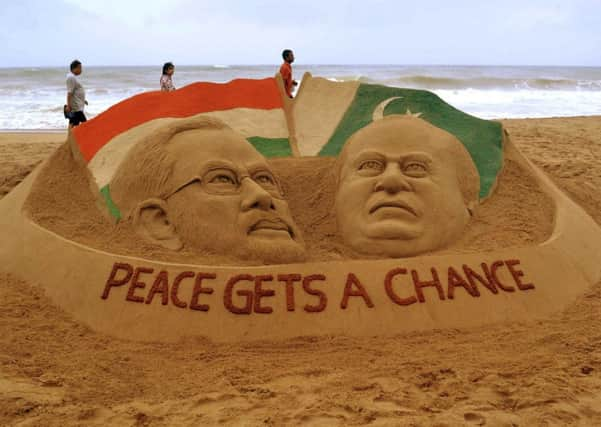Modi peace hopes in India-Pakistan relations


In an unexpected diplomatic move, Mr Modi has invited seven South Asian Association for Regional Co-operation (SAARC) nations’ state heads for his swearing in ceremony, signalling a new beginning of regional cooperation in South Asia.
The Modi oath-taking is already set to be historic with the attendance of all heads of state already being confirmed. The Pakistan prime minister Nawaz Sharif ending the three days of suspense over his visit amid reports that there was stiff opposition from hardliners in Pakistan on Saturday agreed to attend the inauguration.
Advertisement
Hide AdAdvertisement
Hide AdAny talks with Mr Sharif would be the first face-to-face meeting between the leaders of India and Pakistan since September. Mr Modi, 63, will be sworn in as India’s prime minister after his party won the first outright majority in parliament in 30 years. Mr Sharif, 64, who was elected last year to a third term as Pakistan’s prime minister and has promised to improve ties with India, called Mr Modi to congratulate him after the election victory on May 16.
Interestingly, this is the first time an Indian PM-designate has sent such invites to the leadership of India’s neighbours. Mr Sharif, who has been Pakistan prime minister three times, has never been to India on an official tour.
Indian foreign diplomacy experts are viewing Mr Sharif’s visit to India as pivotal for efforts to improve the relationship between the two countries. Since independence in 1947, both have shared complex and tense relations. Three major wars, a large-scale conflict, continuous threat of Pakistan-based and trained terrorists, and Pakistan’s perpetual desire to keep Kashmir boiling may not help Mr Modi much in his diplomatic endeavour.
Despite the peaceniks across the border, the Pakistan Army still considers India as its number one foe. The recent statement by Pakistan’s army chief, General Raheel Sharif, that Kashmir is a “jugular vein of Pakistan” was a manifestation of a hidden agenda to keep Kashmir as an issue.
The official spokesperson of the Indian ministry of external affairs, Syed Akbaruddin, confirmed that Pakistan has formally accepted India’s invite. Besides Pakistan, Sri Lanka’s president Mahindra Rajapaksa, Afghanistan’s president Hamid Karzai, Bhutan’s prime minister Tshering Tobgay, Nepal’s PM Sushil Koirala and Maldives’ president Abdulla Yameen Abdul Gayoom will attend the ceremony. Bangladesh will be represented by parliament Speaker Shirin Sharmin Chaudhury, since prime minister Sheikh Hasina will be away on a pre-scheduled visit to Japan. Prime Minister Navin Ramgoolam of Mauritius too will be in Delhi.
The focus of Mr Modi’s unprecedented diplomatic outreach to SAARC is definitely Pakistan. Sources in Indian foreign ministry revealed that Mr Modi will have his first set of bilateral meetings tomorrow.